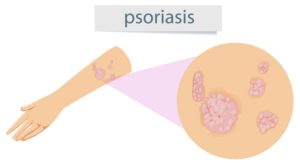 Psoriasis raises the risk of type 2 diabetes depending on the intensity of the skin disorder. Psoriasis has been found to be an independent risk factor for type 2 diabetes, with a much greater risk found in those with severe psoriasis. The researchers estimate 115,000 individuals will develop type 2 diabetes based on their risk of psoriasis alone.
Psoriasis raises the risk of type 2 diabetes depending on the intensity of the skin disorder. Psoriasis has been found to be an independent risk factor for type 2 diabetes, with a much greater risk found in those with severe psoriasis. The researchers estimate 115,000 individuals will develop type 2 diabetes based on their risk of psoriasis alone.
Joel M. Gelfand, associate professor of Dermatology in the Perelman School of Medicine, said, “These data suggest that patients with psoriasis are at increased risk for developing diabetes even if they don’t have common risk factors such as obesity. Patients with psoriasis should eat a healthy diet, get regular exercise, and see their physician for routine preventative health screenings such as checks of blood pressure, cholesterol, and blood sugar.”
Advertisement
Psoriasis is an inflammatory skin condition, which causes the skin to become thick, inflamed, and scaly. Psoriasis has also been associated with myocardial infarction, stroke, metabolic syndrome and cardiovascular mortality.
Lead author Rahat S. Azfar said, “In addition to having an increased risk of diabetes, people with psoriasis are more likely to have metabolic syndrome, high triglycerides, and raised glucose levels, even if they are not overweight or have other common risk factors for these conditions. Both patients with psoriasis, especially those with severe psoriasis, and their treating physicians should be aware of the potential for systemic metabolic complications associated with this skin disease.”
The study compared 108,132 psoriasis patients matched with 430,716 controls and uncovered that patients with mild psoriasis had an 11 percent higher risk of diabetes compared to the matched controls. Those with severe psoriasis had a 46 percent higher risk of diabetes, compared to the controls. Other findings uncovered that psoriasis patients with diabetes were more likely to require medication treatment for diabetes, compared to diabetics without the skin disease.
Additional research is required to determine the effects of psoriasis treatment on potentially lowering the risk of type 2 diabetes.
Psoriasis and diabetes link
It may seem odd that a skin condition would be associated with diabetes, but the two diseases actually have many aspects in common, which explains the link a bit more. For starters, both increase inflammation. Inflammation as a result of psoriasis can increase the amount of insulin-like growth factor in the body – which is linked to diabetes. Psoriasis also impacts the immune system in ways that affect insulin, leading to diabetes.
Psoriasis and diabetes also share common health conditions, including obesity, higher body mass index, high cholesterol, high blood pressure, cardiovascular disease, and stroke.
Lastly, psoriasis and type 2 diabetes also share many common lifestyle factors that affect either condition. Shared lifestyle factors include smoking, drinking alcohol, and unhealthy eating.
These commonalities between the two conditions offer some insight on how one plays into the other. Therefore, by controlling the factors you can control, you can prevent or better manage psoriasis and type 2 diabetes.
Related Reading:
Psoriasis patients have fewer opportunities for biologics treatment
Psoriasis patients have fewer opportunities for biologics treatment as they age. The findings suggest that age is a large factor when it comes to treatment options for psoriasis – a skin condition. The researchers found that an age increase of 30 years reduced access to treatment through biologics by 65 percent. Continue reading…
Advertisement
Psoriasis skin disorder inflames arteries, increases heart disease risk
New research suggests psoriasis, a skin disorder, leads to artery inflammation and increases heart disease risk. Senior investigator, Dr. Nehal Mehta said, “As the amount of psoriasis increases, the amount of blood vessel inflammation increases.” The team also uncovered that psoriasis may add to the risk of stroke and heart attack, even mild cases. Continue reading…
Sources:
http://www.uphs.upenn.edu/news/News_Releases/2012/06/diabetes/
http://www.everydayhealth.com/psoriasis/psoriasis-type-2-diabetes-link.aspx
